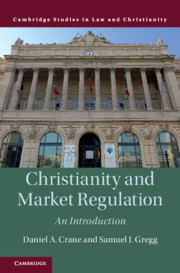Book contents
- Christianity and Market Regulation
- Law and Christianity
- Christianity and Market Regulation
- Copyright page
- Contents
- Contributors
- Acknowledgments
- Introduction
- 1 Christianity and the Morality of the Market
- 2 The Common Good and the Role of Government in Regulating Markets
- 3 Public Choice Theory and Interest Group Capture
- 4 Christianity and Antitrust
- 5 Christianity and Corporate Purpose
- 6 Is Entrepreneurship Christian?
- 7 Subsidiarity and the Role of Regulation in the Financial Sector
- 8 Christianity and Bankruptcy
- 9 Patents, Access to Health Technologies, and Christianity
- 10 Price Controls and Market Economies
- Index
3 - Public Choice Theory and Interest Group Capture
Published online by Cambridge University Press: 18 June 2021
- Christianity and Market Regulation
- Law and Christianity
- Christianity and Market Regulation
- Copyright page
- Contents
- Contributors
- Acknowledgments
- Introduction
- 1 Christianity and the Morality of the Market
- 2 The Common Good and the Role of Government in Regulating Markets
- 3 Public Choice Theory and Interest Group Capture
- 4 Christianity and Antitrust
- 5 Christianity and Corporate Purpose
- 6 Is Entrepreneurship Christian?
- 7 Subsidiarity and the Role of Regulation in the Financial Sector
- 8 Christianity and Bankruptcy
- 9 Patents, Access to Health Technologies, and Christianity
- 10 Price Controls and Market Economies
- Index
Summary
The public choice research project made its appearance in the middle of the twentieth century, and is primarily the brainchild of American and British intellectuals. The scholars associated with this research project focused on how individual actors participated in collective decision-making within the democratic, participative political systems of their time. Authors associated with the public choice research project point out that their work was inspired by, or derives from, the political economy practiced by Adam Smith, David Hume, Niccolò Machiavelli, and even Knut Wicksell and Joseph Schumpeter, whose work straddled the nineteenth and twentieth centuries. There was a time when the social sciences were less compartmentalized, and when the study of politics, economics, and even political philosophy was intertwined. As is common in the social sciences, few authors explore the intersection of the political sphere with Christianity, seen as a historical, cultural, and spiritual reality. Some may consider it unprofessional to use a faith-based lens to interpret a scientific discipline, while others may be influenced by their personal agnosticism or atheism.
- Type
- Chapter
- Information
- Christianity and Market RegulationAn Introduction, pp. 44 - 73Publisher: Cambridge University PressPrint publication year: 2021
- 1
- Cited by



